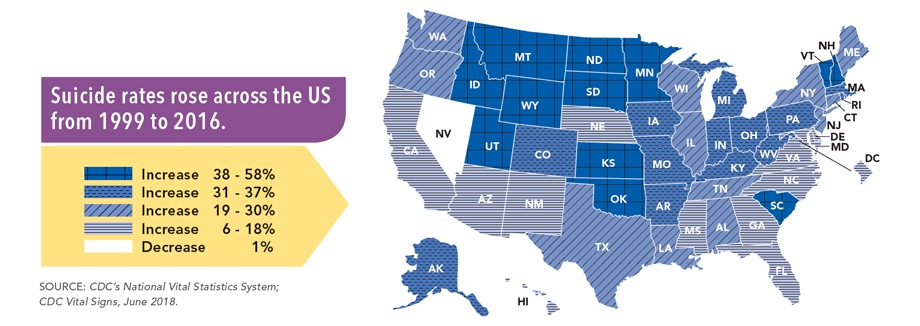During a week in which we learned of the suicides of Kate Spade and Anthony Bourdain, the U.S. Centers for Disease Control announced that suicide rates in the U.S. have increased nearly 30%, and the rate of suicide increased in 49 of 50 states during that time.
There's no one explanation for the explosion in suicide rates across the population. Here are eight thoughts for church leaders and my fellow Christians to consider in making sense of the suicide epidemic.
Escalating suicide rates are another sign of the decreasing influence of Christianity in the larger culture. Twenty years ago, the fear of God was often cited by teens sitting in my office as a deterrent to acting upon suicidal thoughts. As fewer and fewer people believe in God, we'd expect less constraint on suicidal behavior resulting from fear of eternal consequences. We also know there's an inverse relationship between church attendance and suicide. This study of middle-aged women demonstrated a five-fold decrease in suicide rates among weekly church attenders.
The increases in suicide rates represent a natural consequence of a culture beginning to embrace physician-assisted suicide. Is it any surprise that suicide raters are increasing as more states move to legalize physician-assisted suicide? We glamorize the lives of people like Brittany Maynard, a young, attractive woman with brain cancer who overdosed on medication prescribed by her doctor. Or the elderly couple in Toronto who were well enough to enjoy date night at their favorite restaurant two days before committing suicide together with the assistance of their physicians. Here's a look at research showing the increases in suicide rates that result where physician-assisted suicide is legalized.
Suicide is a symptom of society's emphasis on self-determination. Here's a summary of the argument for the right to assisted suicide from a physician serving and transgender activist who bases their argument on the right to self-determination. Quoting from Dr. Dana Beyer's post...
Self-determination is intimately bound up with all three rights. An individual should be free to live her life as she sees fit, and not submit to her family, friends, physicians or religious community, and certainly not to the state. While there are profound ethical issues that touch upon this time of life, they do not trump the person’s right to live fully to the very end, and alleviate her own personal suffering - her final pursuit of happiness.
We have lots of people who commit suicide with serious, unidentified mental health issues. An interesting finding in the CDC data is that more than half of people who died by suicide (54%) did not have a known mental health condition.
Our mental health treatment isn't particularly effective, especially when it comes to treating depression and anxiety that often contribute to suicide. Take a look at this data examining suicide rates in the U.S. population from 1950-present.
The first antidepressant medications came out in the 1950s and 1960s. The first SSRIs (Prozac and Zoloft) came out in 1988 and 1991, respectively. Over the next decade, we saw significant decreases in suicide rates, even though the effect sizes of antidepressants for depression are relatively small. The rates today are higher than those of seventy years ago, before we had any effective treatment for mental health conditions contributing to suicide risk.
Publicity around suicide lowers the threshold for other people to commit suicide. Here's a summary from a national workshop held by the CDC on contagion associated with reporting of suicide. The problem is likely worse following the advent of online media dependent upon "clicks" resulting from attention-grabbing headlines.
We're losing our ability to respond appropriately to adversity. Research suggests that resiliency following stressful events is in short supply. According to the CDC, four of the five most common factors associated with suicide include relationship problems, a crisis in the past or coming two weeks, a physical health problem or a job/financial problem. People who lack the resources to respond to stressful life events are at greater risk of suicide.
People are more socially isolated and lonely than ever before. A former surgeon general discussed the extent to which loneliness represents a public health crisis. One hypothesis behind the protective value of regular attendance at worship services is the social interaction that takes place at church.
To my church friends...We need to quit hiding our light under a bushel basket! We have a Gospel that provides a sense of meaning and purpose and hope for the future resulting from our faith in Christ. We can provide companionship and community to people who are lonely and isolated. To be "pro-life" includes taking an interest in the lives of the people around us who are hurting.
Interested in learning more about recognizing risk factors for suicide in the people around you? Check out this information from the folks at the CDC. If you need help for yourself or someone else, please contact the National Suicide Prevention Lifeline at 1-800-273-TALK (8255) or chat online at www.suicidepreventionlifeline.org.
*****************************************************************************************************************
Are you a pastor or ministry leader searching for resources to better understand how to support children, adults or families affected by mental illness in your church or in your community? Check out Key Ministry's Mental Health Resources page, containing links to video, articles and topical blog series designed to help you minister with persons with common mental health conditions. Also available through the website are a free, downloadable mental health ministry planning tool designed to accompany Mental Health and the Church, along with links to recommended books, like-minded mental health ministry organizations, relevant research, sermons addressing mental illness, social media resources and a compilation of stories from families affected by mental illness.








